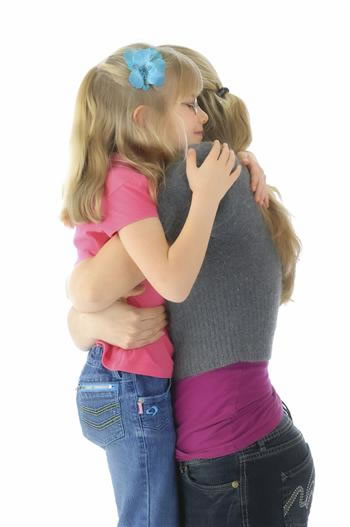
Kelly put it beautifully -- when we reach out to hold a whining child, we really are like a lightning rod, helping our child to ground herself. Once she's restored to a state of balance and well-being, she no longer needs to whine.
Whining can drive any parent crazy. It's tempting to tell them we can't listen until they use a more grown-up voice. But kids aren't grown-ups, and their whining is a plea for help. Quite simply, children whine when they're overwhelmed. They need to borrow our calm love so they can self-regulate.
So when your child whines, take a deep breath to calm yourself. Then reach out your arms and say "Are you out of hugs again? I think maybe you need a hug. I need one, too!"
Then, settle in. It might take ten minutes, as Kelly says, and that can seem like an impossible amount of time when we're rushing to get something done and juggling the needs of other children. But if you don't take this time to address the root of the whining, your child will almost certainly still be whining in ten minutes. So you can spend this ten minutes peacefully, or irritably.
And, of course, it won't necessarily take ten minutes. Often, it takes 30 seconds. But going into the hug with the intention of showing up for as long as you need to is what anchors you and your child into calm. That settles the storm, slows the breathing, and allows your child to re-set and try again.
What's more, every time you do this, you build trust. You help your child develop the neural connections to self soothe. So you'll see the difference in your child's mood, level of cooperation, and connection with you more and more quickly over time.
Couldn't be more simple, right? You aren't teaching. You aren't coaxing your child to talk. (Although teaching and talking are fine once you both calm down, as long as you resist lecturing and do more listening.) You're just holding your child. Creating safety and connection. That's enough for your child to do a neurological re-set.
Here are ten benefits you automatically get from this simple practice:
1. You help your child restore her sense of inner balance in this moment so she no longer needs to whine.
2. You help your child learn how to restore his own balance in the future, when you aren't around to help.
3. You teach your child that we can always find our own inner well-being by reconnecting with ourselves in the present moment. When we don't learn this, we tend to look instead to food, alcohol, technology, etc to regulate our inner state.
4. You refill your child's cup so the rest of his day unfolds happily.
5. You help her cry, if that's what she really needs to do. That's a good thing. After she cries, she'll feel so much better, which means that you'll have a better day, too!
6. You help him empty his emotional backpack so he's less anxious, more flexible, and more joyful.
7. You strengthen your relationship with your child. That's what restores the joy to parenting for you!
8. You help your child know you're on her side which makes her much more likely to cooperate, to trust you, and to tell you the truth.
9. You strengthen your empathy for your child, which is what helps you raise an emotionally intelligent child.
10. You ground yourself. Think of it as enforced meditation.
Now, that's what I call time well-spent. In fact, even if your child isn't whining, you may want to initiate a long snuggle!
***





